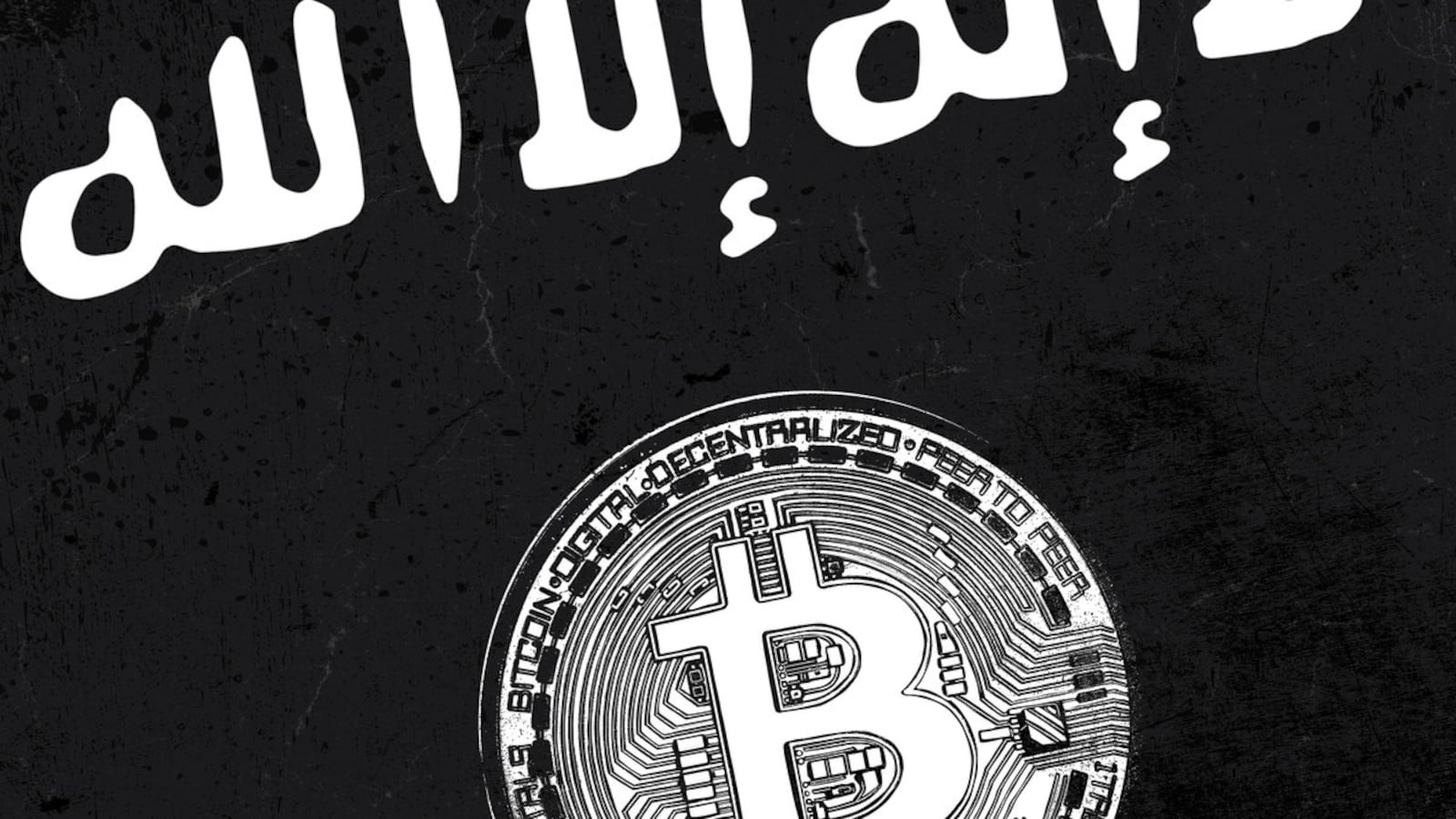When President Donald J. Trump talks about the withdrawal of American forces from Syria, he’s turning his back on more than U.S. allies and the problem of their hardened prisoners from the so-called Islamic State. The president also turns his back on what has in many ways become a proving ground in the war on terrorism.
Syria has been an incubator for every innovation to the global jihad in the last decade: social media recruitment, lone-wolf inspiration, and, as of the last few years, the essential pillar of any terrorist group: financing.
A terrorist organization cannot exist without money, and since 9/11 draining those resources has been an indispensable component of fighting them. But what progress the world has made against terrorist financing in Syria is becoming increasingly irrelevant as ISIS, al Qaeda, and other jihadi groups are reviving once-dying fundraising machines with a previously untapped resource: crypto-currency.
When I began tracking terrorist financing rings in the late 1990s, they relied on charities and person-to-person resources like hawalas, which are systems of transferring money between different networks of families and trusted associates. As technology evolved, so too did terrorists, embracing services like Western Union, Moneygram, and PayPal. These developments brought forth slews of regulations and security protocols by governments and the companies themselves.
At the same time these new security measures mounted, a perfect storm of circumstances were shaping in Syria that would make the country the springboard for the jihadis’ embrace of crypto.
First was the increasing popularity of cryptocurrencies like Ethereum, Monero, Lumens, Zcash, and of course Bitcoin, along with the increasing ease of exchanges. Second was the July 2016 dissolution of the Nusra Front, al Qaeda’s former Syrian affiliate. At the same time, major offensives against ISIS were well underway, shrinking its territory and removing ISIS from many of its oil fields and other financial resources. That put many foreign fighters out of a paycheck—and, with no family in Syria, short on ways to get money.
Worsening their situation, Syria was a virtual dead zone for money transfers. Now without income, ISIS and al Qaeda fighters’ only real way to get money from whatever families, friends, and supporters they had overseas was through hawala-style transfers made to neighboring countries like Turkey—an already risky process made even less reliable because of heavy monitoring by government agencies.
Jihadists in Syria needed to get creative. And, considering their options, what better starting point did they have than a largely unregulated, under-the-radar resource, that is, crypto?
By 2016, ISIS and al Qaeda fighters were already calling for crypto donations on social media. ISIS, like many other groups’ central commands, never outwardly fundraised for Bitcoin donations, but its operatives and fighters have done so on its behalf behind the scenes on social media and other platforms at least as early as 2015. By 2017, ISIS had long been receiving Bitcoin donations from all over the world, with numerous cases coming out of the US in places like New York and Virginia. To this day, you can find calls for Bitcoin donations across ISIS-linked chat groups on Telegram. ISIS would eventually even use Bitcoin to fund attacks, including the deadly Easter Day bombings in Sri Lanka bombings this past April.
Likewise, groups like al-Sadaqa, run by Western fighters associated with other jihadi factions in Syria, were among the first to fundraise with Bitcoin in any significantly organized sense. It fundraised for weapons with Bitcoin “so people from outside [Syria] can donate towards the jihad [securely] without getting [caught].” The money, according to the group, would “help by buying other items maybe guns.”
These fundraising messages were posted publicly on platforms like Twitter, YouTube, Telegram, Facebook, and Instagram. And they were anything but shy about where the money was going. In December 2017 al-Sadaqa launched a campaign for “ribat” (garrison position) upgrades. It released a video that following February thanking donors while showing video footage of their upgraded space:
We are your mujahideen brothers. We thank the brothers from Al Sadaqah for their help in reinforcing this guarding point, and we tell the brothers that we are in need of more donations, so we are able to stand firm against our enemy.
Such independent fundraising efforts were effectively proof-of-concept demonstrations. Donations came in, fighters got their money, and everything came together. By late 2017, groups linked to ISIS, al Qaeda, and other organizations began embracing this approach. Incite the Believers’ Operations Room, a coalition of Syrian factions including de facto al Qaeda affiliate Hurras al-Deen, solicits Bitcoin donations as part of its ongoing “Prepare Us [For Battle]” campaign, which it launched in May 2019 to supply weapons, ammunition, and other equipment for fighters in Northeastern Syria. Text at the bottom of its propaganda boldly gives a Bitcoin wallet address along with WhatsApp and Telegram contact info.
Malhama Tactical, a group that trains fighters with Hay’at Tahrir al-Sham’s (HTS), a U.S.-designated terrorist organization and the largest faction in Syria, even fundraised for drones to be used toward “artillery adjustment and reconnaissance.” This crypto buzz even reached upward to HTS itself which, in an April 2019 issue of its magazine, took on the utopian language of an avid crypto-bro in hyping Bitcoin as “The Currency of the Future Economy.”
Just as noteworthy as the terrorists’ cleverness is their dogged persistence. One HTS-linked fundraising organization called “Al-Ikhwa” has shared at least nine Bitcoin wallet addresses, generating at least $1,600 in Bitcoin donations among them, based on publicly available transaction records and Bitcoin values calculated based on the date of the exchanges. The update shows a mirroring approach to jihadists tactics against social media companies that delete terrorist accounts, which is simply to create a surplus of back-ups.
For crypto fundraising to truly take off, though, jihadists in Syria needed more than just a currency like Bitcoin by itself. There were still serious obstacles in receiving Bitcoin donations—let alone actually spending them on anything productive.
To start, jihadi fighters in a place like Syria cannot buy food or clothing with Bitcoin directly. Just as your local supermarket prefers to use the currency of your country, so too does most any corner store, landlord, or weapons dealer in Syria. But members and supporters of these groups are finding ways to transfer Bitcoin into serviceable cash by integrating the technology with, ironically, old hawala methods.
This past spring, jihadists began promoting “Bitcoin Transfer,” a service run by jihadists in Idlib, Syria. The announcement of the service, written in English, Arabic, Turkish, French, German, and other languages, describes it as an “anonymous and safe way” to transfer money, written with language clearly meant to assure donors who would never have used crypto otherwise:
You want to receive money from Europe, Saudi, Asia, Africa and America and you don’t want to use unsafe transfer means for the one sending you the money? BITCOIN TRANSFER is the solution.
Services like Bitcoin Transfer show that there is both a demand for Bitcoin exchanges and a capacity to make money on them. But while services like Bitcoin Transfer solve the usable-currency issue, there remains the larger and perhaps more difficult obstacle of getting people to use it. It’s safe to presume the average jihadi supporter knows just as much about crypto as most people: it’s money (but not really money); supposedly secure, but maybe also kind of dangerous; and associated with a lot of shady activities. Thus, you can further presume how wary, or even plain confused a donor might be in using crypto to fund these fighters and groups.
There was, first and foremost, the issue of permissibility. Many banks and related services are, according to many Islamic fundamentalists, not allowed under Shariah law. Addressing these concerns, HTS released a 26-minute video this past July of one of its religious officials, Abu al-Fateh al-Farghali, describing Bitcoin use as permissible according to the Quran, effectively giving the green light for donations.
Promotion for video by HTS religious official
Adding to such messages is a growing wealth of educational material for the crypto layman who might want to donate to a fighter or group in Syria but doesn’t know how to. Bitcoin Transfer, for example, gives detailed breakdowns of how the service works, testimonials from ‘customers,’ and even offers prospective donors the option of contacting them if they have any questions about the process. A quick breakdown of the group’s services, as it describes them, reads:
Our work
1. The sender knows how to buy bitcoins: he sends us the bitcoin in our wallet, we convert them in dollar and you receive them in 3-4 days.
2. The sender doesn’t know how to buy bitcoins: the company helps him to buy bitcoins, we convert them in dollar and give you your money.
3. Depending on the country of the sender, we have other means of receiving your money.
All these elements—the transfer services, the religious green lights, the instructions—gave proof that jihadi groups can use crypto to safely, consistently, easily raise funds. And, as has been the trend for nearly a decade, what started in Syria would be emulated across the globe.
Perhaps it doesn’t catch much attention when Syrian groups and militants, obscure in some contexts, use Bitcoin. But what about one of the most diligently tracked, widely designated groups in the world?
This past January, Izz ad-Din al-Qassam Brigades, the terrorist-designated military wing of Hamas, issued an announcement reading, “Izz ad-Din Qassam Brigades announces the beginning of receiving your financial support for the resistance by the currency ‘Bitcoin’ through the official wallet address and is only posted on the Qassam site.” The group has since then built an impressive financing infrastructure around Bitcoin, including an elaborate system in which a new Bitcoin address is generated for each user, intended to make the transfers much harder to source.
Izz ad-Din al-Qassam Brigades has since released its own video showing how to purchase and send Bitcoin, with the same educational focus seen in Syria. The directions have come to span Arabic, English, French, Malay, Indonesian, Russian, and Turkish. In June, the group’s spokesman thanked those “who have responded and continue to respond to our call by helping the resistance with digital currency,” announcing further pushes for more fundraising efforts.
Hamas is not the only group outside of Syria using crypto. Jaish al-Ummah, a pro-al-Qaeda organization based in Gaza, launched its own Bitcoin fundraising campaign this past May, bluntly stating the aim to be supplying its fighters “with weapons and ammunition.”
Since 9/11, government agencies and financial institutions have together made major progress in cutting off terrorist financing. Money is, after all, a critical pillar of every terrorist group, powering everything from their media productions to actual attacks. To see terrorist groups use a yet-budding technology like crypto to sidestep this progress is a serious matter.
These developments shouldn’t be surprising. Just as terrorists embraced social media, messenger platforms, and other technologies for recruitment and planning attacks, it was inevitable that they would also add cryptocurrency for fundraising. It took years for social media companies and government agencies to understand—let alone act on—jihadist recruitment online, and the results of the delay were disastrous: thousands of people leaving home for battlefronts or carrying out attacks in their homelands. It is incumbent on us to learn from these mistakes, otherwise we are doomed to see a similar scenario play out in the financial realm.
Observing these evolving fundraising machines alone, President Trump’s abandonment of America’s allies on the ground will have effects cascading well beyond northern Syria. Based on what we’ve seen already—the successful fundraising drives, well-functioning (and even profitable) currency transfer infrastructures around them, and the recent adoption by groups outside of Syria—there is no reason to doubt that this model of terrorist fundraising will only spread to other fronts. And as long as the money keeps coming in for ISIS, al Qaeda, and other jihadist organizations, efforts to counter them will be in vain.








